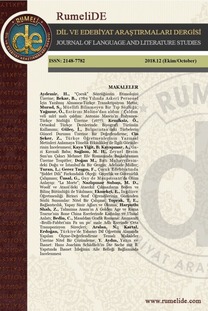Howards End: Kapitalizm “Ne kadar büyük ağzın var …”
E. M. Forster tarafından 1910 yılında kaleme alınan Howards End adlı roman, 20 yüzyılın başlarında İngiltere’de Edward dönemi toplumunda yaşayan zengin kapitalist Wilcox ailesi, yarı Alman entelektüel Schlegel ailesi ve alt sınıfa ait yoksul Bast ailesi olmak üzere üç aile etrafında döner. Genellikle, Forster’ın başyapıtı olarak kabul edilen bu romanda, karakterlerin kimlikleri üzerinden moderniteye vurgu yapılarak kapitalizmin kaçınılmaz etkileri, Viktorya döneminin eski yargılarının sürekli sorgulandığı Edward dönemi kültürü içinde anlatılır. Bu nedenle, bu çalışma kapitalizmin pençesindeki karakterlerin kimliklerini, özellikle onların kapitalizmin iki biçimine, yani özel mülkiyet ve sermaye birikimi ile ilgili görüşlerini ele alarak Marksist yaklaşımla çözmeye çalışmaktadır. Forster kapitalist üst-orta sınıf, entelektüel üst-orta sınıf ve işçi sınıfı olmak üzere toplumdaki üç farklı sınıftan karakterleri bir araya getirerek birbirinden farklı bakış açılarıyla kapitalizmin etkilerini karakterlerin kimlikleri üzerinden düşündürücü bir yaklaşımla anlatır. Liberal görüşlü bir yazar olarak kabul edilen Forster, Howards End adlı romanında hem modernite hem de kapitalizmin etkisi nedeniyle Edward toplumundaki kaçınılmaz kültürel değişimi de ortaya koymaktadır. Bu çalışmada, karakterlerin farklı sınıflara ait olmaları nedeniyle özel mülkiyet ve sermaye birikimi ile ilgili bakış açılarının birbirinden farklılık gösterdiği sonucuna varılmıştır. Bununla birlikte, işçi sınıfının entelektüel sınıf dahil olmak üzere üst-orta sınıf tarafından sömürüldüğü sonucu da çıkartılmıştır.
Anahtar Kelimeler:
E. M. Forster, Howards End, kapitalizm, modernizm, kimlik
Howards End: Capitalism “What big mouth you have …”
Howards End (1910), a novel by E. M. Forster, revolves around three families, namely the rich capitalists Wilcoxes, the half-German intellectual Schlegels and the impoverished couples the Bast from lower class, in the Edwardian society in England at the very turn of the 20th century. The novel, which is commonly considered to be the masterpiece of Forster, undoubtedly depicts the inevitable effects of capitalism on the identities of characters with a focus on modernity in the Edwardian culture where the earlier certainties of the Victorian period are continually questioned. Thus, this paper attempts to unveil identities of characters who are in the grip of capitalism by decoding their insights, particularly on two modes of capitalism: private ownership and capital accumulation through the lenses of Marxism. Forster, by juxtaposing the characters from three different classes in the society, namely the capitalist upper-middle class, the intellectual upper-middle class and the working class, thought-provokingly presents the impacts of capitalism on the identities of the characters from a wide variety of perspectives. As a liberal author, Forster reveals the inevitable cultural change in the Edwardian society due to the destructive effects of both modernity and capitalism in Howards End. In this paper, it is concluded that the perspectives of the characters in the novel about capitalism, particularly in regard to capital accumulation and private ownership, vary from each other due to the different classes they belong to. Moreover, it is also concluded that the working-class are the ones who are exploited by the upper classes, including the intellectuals in the capitalist system.
Keywords:
E. M. Forster, Howards End, capitalism, modernism, identity,
___
- Berman, M. (1983). All that is solid melts into air: The experience of modernity. London: Verso.
- Childs, P. (2017). Modernism. (3rd ed.). New York: Routledge.
- Duplessis, N. M. (2008). Literacy and its discontents: Modernist anxiety and the literacy fiction of Virginia Woolf, E. M. Forster, D. H. Lawrence and Aldous Huxley. (Unpublished doctoral dissertation). A & M University, Texas.
- Eccleshall, R. (1986). British liberalism: Liberal thought from the 1640s to 1980s. Harlow, Essex: Longman.
- Firchow, P. E. (1981). Germany and Germanic mythology in Howards End. Comparative Literature, 33(1), 50-68.
- Forster, E. M. (1910). Howards End. USA: Dover Thrift Editions (2002).
- Gordon, M. (2004). “Things that can’t be phrased”: Forster and Howards End, Salmagundi, 143, 89-103.
- Habermas, J. (2001). “The discipline of aesthetics” in Leitch, V. B., (Ed.). (2001). The Norton anthology of theory and criticism. USA: W.W. Norton & Company, Inc.
- Kermode, Frank (2009) Concerning E. M. Forster, London: Weidenfeld & Nicolson.
- Larrain, J. (2000). Identity and modernity in Latin America. Cambridge, UK: Polity.
- Levine, R. F. (1998). Social class and stratification. England: Rowman & Littlefield Publishers, Inc.
- Macdonald D. A. (1953). Theory of mass culture. Diogenes. 1(3):1-17.
- Martin, R. K, & G. Piggford. (1997). ‘Introduction: Queer Forster?’ Queer Forster. Ed. Robert K. Martin, & George Piggford. Chicago: University of Chicago Press.
- Marx, K., & Engels, F. (1848). The communist manifesto (trans. 2016). London: Verso.
- Medalie, D. (2002). E. M. Forster’s modernism. New York: Palgrave.
- Rijswijk, V. H. (2010). Mrs. Donoghue and the law’s strange neighbour: New narratives of modernist Trauma. Groth, H., & Sheehan, P. (Eds.). (2009). Remaking literary history. United Kingdom: Cambridge Scholars.
- Rose, J. (2001). “What was Leonard Bast really like?” The intellectual life of the British working classes. New Haven: Yale UP, 393-438.
- Sarup, Madan (1983). Post-structuralism and postmodernism. (2nd ed.). UK: Harvester Wheatsheaf.
- Sidorsky, D. (2007). The uses of the philosophy of G.E. Moore in the Works of E. M. Forster. New Literary history. 245-271.
- Smith, H. A. (1966). ‘Forster’s humanism and the Nineteenth-century’, in Forster: A collection of critical essays. Malcolm Bradbury (ed.), Englewood Cliffs, New Jersey: Prentice-Hall Inc.
- Sugate, A. S. (2012). The novels of E. M. Forster: A thematic study. (Unpublished doctoral dissertation). Shivaji University, India.
- Thacker, A. (2000). E. M. Forster and the motor car. Literature & History, 9(2), 37-52.
- Williams, R. (1961). Culture and society, 1780-1950. Harmondsworth: Penguin [1958].
- ISSN: 2148-7782
- Yayın Aralığı: Yılda 6 Sayı
- Başlangıç: 2014
- Yayıncı: Yakup YILMAZ
Sayıdaki Diğer Makaleler
Howards End: Kapitalizm “Ne kadar büyük ağzın var …”
Veba Geceleri’ne eleştirel bir bakış
Karşık dilli eserlerde Batı ve Doğu Türkçesine özgü birtakım sözlerin tanıklanma sıklığı
Yahya Kemal BEYİTOĞLU, Özlem DEMİREL DÖNMEZ
Alageyik filmi ile Avcı filmindeki geyik imgesine karşılaştırmalı bir bakış
-{(y)AsIyA} zarf-fiil ekinin işlevleri üzerine
Şair adını anmak: Garâmî Dîvân’ında şairler
Kelimelerden şehir: Osmanlıda şiir-şehir ilişkisi
“Thou Art The Man” by Edgar Allan Poe “Sen Gerçek Bir Beyefendisin”
